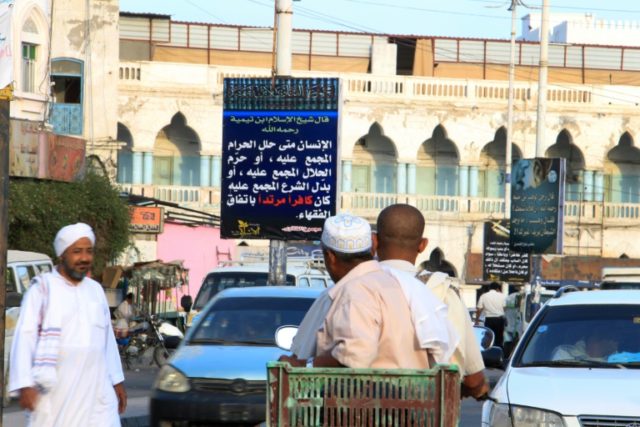Mukalla (Yemen) (AFP) – Ten days after Gulf-backed forces drove Al-Qaeda out of the Yemeni port city of Mukalla, the signs of their harsh year-long rule are still everywhere for relieved residents to see.
Al-Qaeda in the Arabian Peninsula took advantage of the chaos of fighting between pro-government forces and Iran-backed rebels to expand its control in southern Yemen, seizing Mukalla in April last year.
AQAP ruled with an iron fist over the city of 200,000 people, capital of the vast desert province of Hadramawt.
“We lived in terror,” said Mujahid al-Qaiqi, a resident of the central neighbourhood of Dis.
The 22-year-old said he had fears of either being detained by Al-Qaeda or forced to join its ranks.
AQAP established a religious police force tasked with enforcing strict Islamic rules.
The jihadists forced women to cover themselves from head to toe and banned mixing between sexes in public.
They also banned all music, a harsh move in a city with a reputation for its traditional music.
“They even banned songs and dances at weddings,” said resident Alawia Sakkaf.
Issa Ghaleb, a seller of music CDs, said militants arrived one day at his shop and ordered him to erase all recorded music and films.
“Instead, they offered videos of Al-Qaeda operations in Afghanistan, Iraq and Syria,” he said.
Al-Qaeda angered the people of Mukalla by destroying ancient tombs and mausoleums, claiming they were forms of idolatry banned in Islam.
Its police systematically detained couples found together in the city, verifying their identities to ensure that they were close relatives, said resident Saleh Nasser.
Banners announcing the Islamists’ orders against such behaviour are still in place.
“Faithful woman: protect your pure body from prying eyes,” declares an AQAP sign still hanging in a street.
Violators were hunted down and their punishments were often meted out in public.
On January 4, the militants stoned to death a woman accused of adultery.
– Qaeda touted its benefits –
Eventually, however, authorities backed by a Saudi-led coalition turned their firepower on the Sunni Muslim extremists, launching a broad operation against them.
The jihadists vanished when fighters loyal to President Abedrabbo Mansour Hadi swept into the city on April 24 with the backing of Emirati and Saudi special forces.
Now on the streets of the city, patrols and checkpoints manned by security forces have replaced those of the jihadists.
The pro-government forces search vehicles thoroughly in search of infiltrators.
Al-Qaeda’s black and white banners have made way for flags and pictures of Emirati and Saudi leaders.
Despite its restrictions on freedoms, Al-Qaeda made sure public services remained operational in areas under its control.
That was while residents elsewhere across the impoverished country complained of shortages of water and food as well as power cuts due to the ongoing conflict.
“Al-Qaeda militants have made sure that public services like water and electricity were working and they managed to do that,” said Abduljabbar Bajbir, a student from Shihr, a coastal town 60 kilometres (40 miles) east of Mukalla that was also controlled by the jihadists.
In a statement released by Al-Qaeda on April 25 justifying the retreat of its militants, it reminded people of services offered to inhabitants during its rule.
It said jihadists “saved the city from the Huthis,” the Shiite rebels considered heretics by Sunni Islamists, and cities along the coast of Hadramawt had “enjoyed security unseen elsewhere in the country”.
The statement described the jihadist withdrawal from Mukalla as tactical to avoid the destruction of the city, insisting that Al-Qaeda rule allowed it to prosper economically.
But for residents, providing services was not enough to accept AQAP’s rule.
“We feared the consequences of their deviant ideology,” said Bajbir, who fled Shihr when Al-Qaeda militants threatened him for criticising them on Facebook.

COMMENTS
Please let us know if you're having issues with commenting.